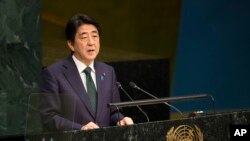In what is being read as a sign of improving relations, Japanese Prime Minister Shinzo Abe and South Korean President Park Geun Hye met briefly at the United Nations on Sunday.
Both leaders are in New York for the 70th session of the U.N. General Assembly.
According to officials from both Tokyo and Seoul, Park and Abe spoke prior to attending a U.N. luncheon and meeting on climate change.
Strained relations
Relations between South Korea and Japan have become tense over unresolved historical grievances and concerns that Japan under Prime Minster Abe has been trying to down play past war crimes.
President Park, who took office in 2013, had refused to hold a formal meeting with Prime Minister Abe until he offered a “sincere apology” to the thousands of women in Asia known as comfort women, who were forced into prostitution to work in military brothels during Japan’s colonial rule until the end of World War II.
Comments by Japanese nationalists saying that the comfort women were not forced but participated voluntarily in prostitution stirred public protests in South Korea and China.
The relations were further exasperated by Abe’s visit last year to a controversial World War II shrine that includes some Japanese war criminals.
A slight thaw
In August, during his speech to commemorate the anniversary of the end of World War II, the Japanese prime minister expressed deep remorse and condolences but seemingly stopped short of meeting Seoul’s apology demand.
However the South Korean president responded in her World War II anniversary speech by opening the door to reconciliation. Park indicated she would overlook Abe’s omissions and focus instead on his promise to uphold apologies by past Japanese leaders including the 1993 Kono Statement that offered apologies and remorse.
At their meeting in New York the leaders of South Korea and Japan reportedly discussed attending the upcoming trilateral summit with Chinese President Xi Jinping, which is being planned for late October or early November.
The trilateral summit, which has not been held since May 2012, would likely attempt to resolve historical disagreements, increase economic cooperation and address regional security concerns including Japan’s efforts to ease restrictions placed upon the military by the country’s post World War II pacifist constitution, regional support for international talks to end North Korea’s nuclear program, and territorial disputes over conflicting claims to islands.





